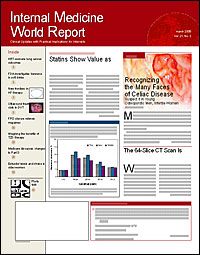Publication
Article
Internal Medicine World Report
Prescribe Antiplatelet Therapy for Patients with PAD
Author(s):
NEW YORK?The recognition of peri?pheral arterial disease (PAD) as a risk factor for coronary disease is increasing, as its prevalence rises dramatically with advancing age. Nevertheless, surveys at?test that physicians are still underdiagnosing and undertreating PAD, suggested Wilbert S. Aronow, MD, clinical professor of medicine, New York Medical College, at a meeting of the Metropolitan Area Geriatrics Society.
Dr Aronow presented data from recent studies on PAD and offered some treatment options.
In one study, 20% of 467 men (mean age, 80 years) and 13% of 1144 women (mean age, 81 years) seen in an academic-based geriatrics practice had symptomatic PAD. A chart review of current and past residents of an academic-based nursing home revealed that 32% of 1160 older men and 26% of 2464 older women had PAD.
Diagnosis of PAD requires the measurement of ankle and brachial systolic blood pressures with a Doppler stethoscope and blood pressure cuffs to calculate the ankle-brachial index (ABI). Dr Aronow noted that "an ABI of <0.90 is 95% sensitive and 99% specific for the diagnosis of PAD." Severity of occlusive leg disease correlates with the risk of ischemic events. "The lower the ABI, the higher the prevalence of 3- or 4-vessel coronary disease," he said, adding that 84% of patients with an ABI <0.40 have 3- or 4-vessel disease.
Among the 620 men and 386 women (mean age, 72 years) seen at a general medical clinic, 27% of the men and 17% of the women had symptomatic PAD. Those with PAD had a higher incidence of hypertension (90% vs 76%), diabetes mellitus (45% vs 22%), dyslipidemia (88% vs 60%), concomitant coronary disease (63% vs 25%), or previous stroke (36% vs 11%).
Many studies have shown the benefits of statin therapy in patients with PAD, regardless of the coexistance of coronary heart disease.
Physicians have been reluctant to use beta-blockers for patients with PAD, in part because of concerns about aggravating intermittent claudication. But a meta-analysis of 11 randomized controlled trials found that beta-blockers had no adverse effects on walking distance or leg symptoms in mild-to-moderate PAD.
It is not only atherosclerosis in other vascular beds that places patients with PAD at risk for ischemic events. Studies have shown that platelet activation in such patients results in vascular endothelial dysfunction and an enhanced prothrombotic state.
Dr Aronow emphasizes that "anti?platelet drugs, such as aspirin or clopidogrel, especially clopidogrel, should be administered to all patients with PAD. Patients with PAD should receive ACE [angiotensin-converting-enzyme] in?hi?bi?tors and also beta-blockers if coronary disease is present."





